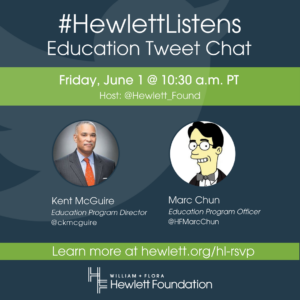As part of our effort to update our grantmaking strategy this year, the education team is committed to getting feedback from a diverse set of people across the country about what works and what doesn’t when it comes to teaching and learning. We’re eager to hear from critics and fans of deeper learning, rural and urban communities, academics and business leaders, educators, and parents alike. Our hope is to use these conversations to craft a revised strategy for our board to review in November.
The prospect of this has us both excited and a bit nervous. This is a terrific opportunity for us to hear from interesting people who live in a variety of places about how they define academic success. So far, our staff have been to Atlanta, Austin, Washington D.C., San Diego, New York, Minneapolis, and Napa, among other stops across the country where we’ve met with teachers, parents, civil rights leaders, business people, and local communities. We’ve visited schools, attended teacher conferences and held candid closed-door meetings. Each conversation has produced lots of ideas for leveraging the portfolio to make the greatest difference for the largest number of kids.
But, as with anyone who is asking for honest opinions, we are also very conscious about the hard conversations to come. Even as we try to understand how to scale deeper learning in classrooms across the country, we are fully aware that many of the students who are furthest from opportunity are being left behind. Often, these students are in places – schools and communities – that lack significant and basic resources. We need to know how we can do better for these kids, and what we can learn from about the spread of deeper learning.
To help start that conversation back in March, we convened nearly 20 civil rights and social justice groups who represented a range of regions – urban and rural – and racial, immigrant, and socioeconomic communities. We wanted to hear about the barriers to equitable education, including outdated visions of success, disparate views of parental involvement, and under-investment by federal and state policymakers. There was considerable discussion about the role of education, where learning occurs, and who should be included in efforts to define success, as well as what constitutes success for our students. The participants were clear that any solutions need to be tailored to meet the specific needs of each community. The groups highlighted the differences between themselves as a plea for us to remember that every community is different, with different needs and contexts, and we should not seek one-size fits all solutions.
When we asked the civil rights groups about the purpose of K-12 education, we heard a familiar response. As with the educators we met at SXSW the following month, there was a prevailing sentiment that students need to be instructed in ways that prepare them to process information and apply the knowledge and the skills they learn in schools to the outside world. This is the core of deeper learning approaches. However, many people we have talked to in the last few months have reminded us that too many teachers and school systems do not prepare students to do more than simply take in information. Time and again, we hear that while academic success is key, student agency is almost more important.
And then, there is the thorny question of what role philanthropy plays in supporting change at the classroom, school, and district levels. The civil rights leaders told us that our first mantra should be to “do no harm” when investing in practices and policies that impact low-income communities. There was a shared sentiment that foundations don’t always consider the people closest to the problems when coming up with solutions to address educational disparities and instead seek to “fix everything” from outside. Earlier this month, we convened a group of superintendents from around the country, who also talked with us about the importance of letting grantees lead the work, and using the foundation’s voice where necessary to influence large-scale changes. Specifically, district leaders were keen that philanthropy think about how to get better, competency-based assessments that are equal to, not in addition to, standardized testing for their students.
 As we think about how to ensure a more centralized role for equity in our refresh strategy, these perspectives and the many others we have collected over the last several months have been both meaningful and helpful to hear. And, though it’s always difficult to “be quiet and listen” during this phase of our refresh, it’s always wonderful to hear these suggestions and ideas coming from new and old partners in this effort. We’ve learned so much already, but this has just been the beginning. There is a lot more listening to be done, and we’ll continue to convene people, visit students, and learn from all of you through the summer.
As we think about how to ensure a more centralized role for equity in our refresh strategy, these perspectives and the many others we have collected over the last several months have been both meaningful and helpful to hear. And, though it’s always difficult to “be quiet and listen” during this phase of our refresh, it’s always wonderful to hear these suggestions and ideas coming from new and old partners in this effort. We’ve learned so much already, but this has just been the beginning. There is a lot more listening to be done, and we’ll continue to convene people, visit students, and learn from all of you through the summer.
To share your thoughts with us, see what we’re hearing during our listening tour, or learn more about our strategy refresh, join the Twitter conversation at #HewlettListens.

